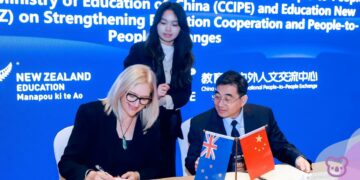Australia is losing its Asia capability, according to the Australian Academy of the Humanities submission to the Parliamentary Inquiry into Building Asia Capability in Australia through the education system and beyond.
Submissions to the inquiry closed on 7 November and more than 120 submissions have been received by the House of Representatives Standing Committee on Education.
“Australia is losing its Asia capability — and with it, a crucial part of our national advantage,” said the President of the Australian Academy of the Humanities, Professor Stephen Garton AM FAHA. “Without coordinated, long-term investment in language learning, cultural understanding and regionally literate research, we risk becoming strangers in our own region.”
Declining Asia capability was a concern shared across submissions the inquiry has received:
“After stop/start policies and years of neglect from Federal and State/Territory Governments, Asia Capability has become a wicked policy problem. There are talks of a ‘crisis’ in Asia Capability”, says Asialink Education in its submission.
The Australian Technology Network of Universities (ATN) is concerned about the superficial engagement with Asia and the structural decline of Australia’s Asia capability pipeline, including through the contraction of university Asian language programs.
The Australian National University (ANU) College of Asia and the Pacific opens its submission with “Australia’s Asia Capabilities are in serious and sustained decline”. It concludes with, “To succeed, to thrive, to enhance our material wealth, yes, but also our societal wealth, we must improve our Asia Capabilities. The time to act is now”.
Other themes raised throughout a range of submissions include teaching Asian languages, the importance of international education, leveraging the Asia diaspora in Australia, and support for the New Colombo Plan.
Teaching Asian languages
Multiple submissions highlighted the decline in teaching of Asian languages in schools and universities. Universities Australia (UA) notes that “despite the critical importance of Asia capability to Australia’s future prosperity and security, there has been a systematic decline in university enrolments in Asian languages”. The University of Tasmania (UTas) refers to it as “the Asian language crisis”.
An additional complexity highlighted by the Australian Consortium for ‘In-Country’ Indonesia Studies (Acicis) is that language studies should not only be conceived of for ‘beginners’ because of the range of existing Asia knowledge and existing diasporas in Australia; for example, those living in homes where an Asian language is used alongside, or instead of, English. Among its recommendations, Acicis advocates for demand-driven funding for the teaching of Asian languages and Asian studies through the Commonwealth Grant Scheme for Australian students.
Pathways and pipelines are needed at school level to address university level uptake of Asian languages and studies, says International Education Association of Australia (IEAA). For example, students should be able to continue studying the same language during primary and secondary schooling within specific school regions.
UA recommends a strengthening of the education pipeline for Asian languages, including through investment in secondary school language programs and supporting teaching training. An allocation of new funding for Australian secondary schools to establish or maintain on-campus Asian languages and Asian studies programs is supported by IEAA (it also includes primary students) and Acicis. And Asialink Education wants support for educators, such as including Asia capability in all pre- and in-service training programs for school and tertiary educators.
The Innovative Research Universities (IRU) takes as step further. It wants government to support universities to keep language courses open.
International education
“Australia’s international education story is intertwined with Asia” says the submission by Independent Higher Education Australia (IHEA), which also highlights the benefits of welcoming Asian students into Australian institutions.
Several submissions argue that international education should be recognised not only as an export industry but as a strategic national asset. The Group of Eight (Go8) urges the Government to recognise international education as a strategic national resource that is critical to building a skilled workforce and advancing Asia Capability. To better harness this potential, the Go8 recommends promoting business awareness of international student and graduate talent and improving employers’ understanding of workplace rights, obligations and opportunities.
Organisations also raise concerns about barriers that limit international student participation. IHEA advocates for the removal of any caps, including what it describes as “soft caps tied to visa processing” reflected in indicative New Overseas Student Commencement allocations. Charles Darwin University (CDU) argues that, if caps remain, they should be aligned with regional workforce needs and the development priorities of Northern Australia.
The International Education Association of Australia (IEAA) recommends exempting international students who complete Australian school qualifications offshore from the Government’s National Planning Levels. Students coming through this pathway, IEAA argues, make “strong contributions to Australia’s Asia capability.”
Leveraging the Asia diaspora in Australia
As many submissions note, Australia cannot rebuild its Asia capability without drawing on the deep linguistic, cultural and professional knowledge already present in Asian diaspora communities.
In its submission the ATN points out that nearly 20% of Australians report ancestry from East, South or Southeast Asia. Asian languages such as Mandarin, Hindi, Vietnamese, and Tagalog are among the most commonly spoken at home other than English. Despite this, ATN says, our systems under-recognise and under-utilise diaspora expertise.
To this end, the ATN recommends that Australia should leverage the Asian expertise already existing within our community and the IRU says that Australia’s migrant and diaspora communities are a valuable resource for developing our Asia capabilities. In its submission, UTas recommends leveraging existing capability in the community. It points out that Australia has substantial Asia language capability within migrant communities.
Community engagement provides authentic learning opportunities and strengthens social cohesion, particularly when local Asian communities are actively involved in educational initiatives, says the Australian Professional Teachers Association.
New Colombo Plan
When it was mentioned in submissions, there was unanimous support for the New Colombo Plan (NCP), with recommendations for expanding the program and additional funding, including:
- Explore mechanisms to support longer term regional engagement for Australian students – such as refocusing the NCP to restore its original immersive intent or partnering with Australian industry to offer internship positions that links study with career pathways – Go8
- Reinstate a broad program of international mobility and engagement that complements the New Colombo Plan – IRU
- Expand the New Colombo Plan scholars program to include postgraduate and VET cohorts, embedding professional immersion and applied research experience – ATN
- Advocacy for and continuation of the New Colombo Plan, including recommendations to support academic champions, engage and consult host communities and ensure access by diverse cohorts – IEAA
University peak bodies also took the opportunity to address funding models of the higher education sector to incentivise Asia capability. Submissions from UA, IRU and Go8 call for reform/removal of the Jobs Ready Graduate (JRG) scheme, with Group of Eight recommending an urgent dismantling of JRG to “address the student contribution burden in the humanities” and IRU, a restoration of government funding for humanities and social sciences and reduction of student fees.
A handful of universities also provided separate submissions, including three of the Western Australia universities (University of Western Australia, Curtin University, Murdoch University), as well as The University of Melbourne, CDU, ANU and University of Tasmania.
A new strategy?
Finally, several submissions recommend the development of a national strategy to build Australia’s Asia capabilities.
Taken together, the submissions point to a broad consensus: rebuilding Australia’s Asia capability is essential for Australia’s long-term prosperity, security and regional standing. To achieve it will require coordinated national action across languages, education pipelines, funding models, mobility programs and diaspora engagement.
The Committee has held two public hearings, one on 29 October and the other on 5 November. There is no published deadline for when the Committee is expected to present its report to Government.
Terms of Reference for the Inquiry
The Committee will inquire into the development of Asia capability within our nation, including the teaching and learning of Asian languages, cultural literacy, and regional engagement within and beyond the formal education system. The inquiry will consider how Australia can build Asia capability across the life course, from early learning through to tertiary education and into the workforce. It will seek to identify system-level reforms and structural enablers that may support development of Australia’s Asia capability.
The inquiry will include consideration of:
- structural enablers and barriers to developing Asia capability, including national and state and territory responsibilities under the Constitution, societal attitudes, institutional arrangements, workforce supply and demand issues and availability of national data.
- good practice models for building Asia capability, including through language learning, intercultural understanding, and regional engagement – including immersive experiences and utilising digital technologies.
- the current state of Asian language learning and Asian cultural studies in schools, universities and the community, and strategies to stimulate demand and improve access.
- opportunities to develop and promote the value of Asian cultural literacy, intercultural understanding and Asian diplomacy skills outside of language learning – across schools, universities, communities, the workforce, industry and government.
- expectations for whole-of-government coordination and collaboration, including roles and responsibilities of Department of Foreign Affairs and Trade, Department of Home Affairs, Department of Education, Department of Employment and Workplace Relations, Austrade, Jobs and Skills Australia and state and territory governments.
- other matters the committee considers relevant.
















